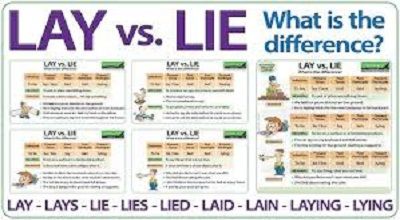Lie vs. Lay
The English language, with its myriad rules and exceptions, often poses challenges for writers and speakers. One commonly misunderstood pair of words is “lie” vs. “lay.” These verbs, although related, have distinct meanings and uses. Understanding the difference can significantly enhance your communication skills and prevent common grammatical errors.
Understanding the difference between “lie” vs. “lay” can be challenging, as they are often confused due to their similar meanings. However, they are used in different contexts and have distinct meanings. Here’s a breakdown of their correct usage:
Lie (intransitive verb):
- Present tense: lie/lies
- Past tense: lay
- Past participle: lain
“Lie” means to recline or rest in a horizontal position. It does not take a direct object.
- Present: I lie on the couch and read a book.
- Past: Yesterday, I lay on the beach for hours.
- Past Participle: I have lain in bed all morning.
Lay (transitive verb):
- Present tense: lay / lays
- Past tense: laid
- Past participle: laid
“Lay” means to place or set something down, and it requires a direct object.
- Present: I lay the book on the table.
- Past: Yesterday, I laid the groundwork for the project.
- Past Participle: I have laid the cards on the table.
Here are a couple of tricks to remember:
If you can substitute the word with “put” or “place,” then use “lay.” Both “lay” and “place” have the letter ‘A’ in them.
- Example: I lay the keys on the counter. (I put the keys on the counter.)
If you can substitute the word with “rest” or “recline,” then use “lie.”
- Example: I lie on the sofa. (I rest on the sofa.)
Note that these guidelines apply to the most common usage, but there are additional meanings for both words in specific contexts. The key is to understand whether you’re describing an action that is done by something (lay) or an action that is done by something itself (lie).
Summary:
- Lie: To recline or tell an untruth.
- Present: I lie down. (no direct object)
- Past: I lay down yesterday.
- Past Participle: I have lain down.
- Lay: To put or place something.
- Present: I lay the book down. (requires a direct object)
- Past: I laid the book down yesterday.
- Past Participle: I have laid the book down.
Finally, practice is key to mastering these distinctions, and paying attention to the context in which these words are used can help reinforce the correct usage.
